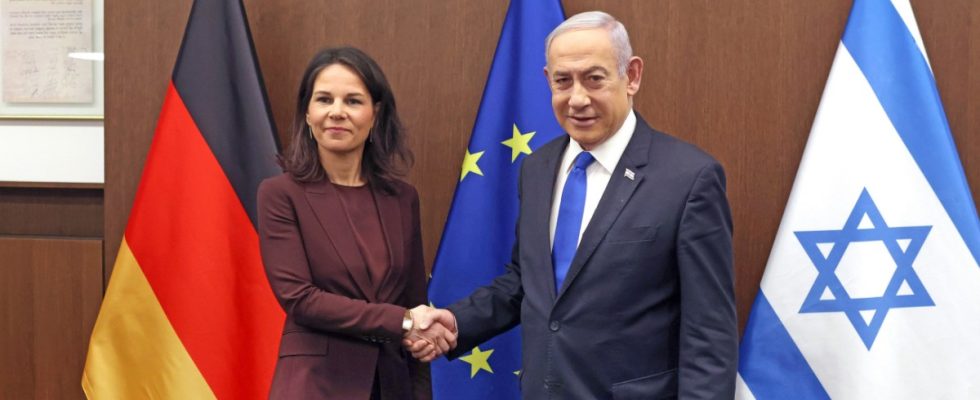In view of the growing threat of war in the Middle East, Federal Foreign Minister Annalena Baerbock tried to relax things during a trip to Israel on Wednesday. After the Iranian attack with drones and missiles, “everyone must now act prudently and responsibly,” she said in Tel Aviv. Israel should “not back down, but exercise wise restraint.” This was countered by Prime Minister Benjamin Netanyahu, with whom she had recently met. “I want to make it clear that we will make our own decisions,” he said, referring to “all sorts of suggestions and advice” from allies. “The State of Israel will do whatever is necessary to defend itself.”
This can be understood as a poorly disguised rebuff to the diplomatic efforts that British Foreign Minister David Cameron also attempted in Israel in parallel to Baerbock on Wednesday. Baerbock therefore described the situation in fire department jargon. She spoke of an “extremely dangerous situation,” an “imminent conflagration,” and specifically called on Iran and its allies “not to add any more fuel to the fire.”
Baerbock’s quick visit fits in with the efforts of the Western allies, driven by great time pressure, to dissuade Israel from a military counterattack that could plunge the entire region into a major war. US President Joe Biden had already started this in a telephone conversation with Netanyahu on Sunday night, when the flashes of light from the missile defense had only just faded. Americans and Europeans are concerned about averting a horror scenario in terms of security policy, but also about the global economy. A major confrontation in the Middle East would cause oil prices to rise and trade routes and supply chains would be threatened.
The Western allies like to combine the call for Israel to react in moderation with the point that the successful defense of the Iranian attack thanks to its superior air defense could also be used as an opportunity. Israel has thus “already proven its strength,” argued Baerbock in Tel Aviv. “Now it’s important to secure this defensive victory diplomatically.”
It is unclear when a military counterattack might occur
But Israel leaves no doubt that the Iranian attack must be responded to offensively for reasons of deterrence alone. “We cannot remain silent after this type of aggression,” said army spokesman Daniel Hagari. “Iran will not go unpunished.” What is deliberately left open is how massively and when the answer will come.
There are signs that Israel may take some time to respond militarily. Netanyahu said the counterattack would be decided “wisely” and “not based on gut instinct.” Referring to the Iranians, he said: “They must be nervous, just like they made us nervous.” Army chief Herzi Halevi hinted that it could still wait for the high Jewish holiday of Passover, which begins early next week. Citizens should be able to enjoy this time “almost as normal”. But this could just be a feint to lull the arch-enemy into a false sense of security.
Beyond the military threat, Israel is also calling for what Foreign Minister Katz calls a “diplomatic attack” on Iran. He demanded two things from his allies: the listing of the Revolutionary Guard as a terrorist organization plus sanctions against the Tehran regime. The urgent desire to increase political and economic pressure is certainly directed not least at Germany, which from Israel’s perspective has often been too lenient with the regime and too generous in trade relations in the past.
During her visit to Israel, Baerbock was able to point to a declaration of intent from the EU to tighten sanctions against Iran. At a video conference on Tuesday evening, the 27 EU foreign ministers agreed in principle to expand trade restrictions and, above all, to make it more difficult for Iran to build missiles. In Israel, the Foreign Minister promised that the Iranian attack “will not be without further consequences” and will lead to “massive sanctions.”
This topic is also on the agenda at the special summit of EU heads of state and government on Wednesday evening and at the meeting of the G-7 foreign ministers on the Italian island of Capri. Baerbock flew there directly from Tel Aviv on Wednesday afternoon. She will not bring any signs of relaxation in the Middle East with her from her trip to Israel.

